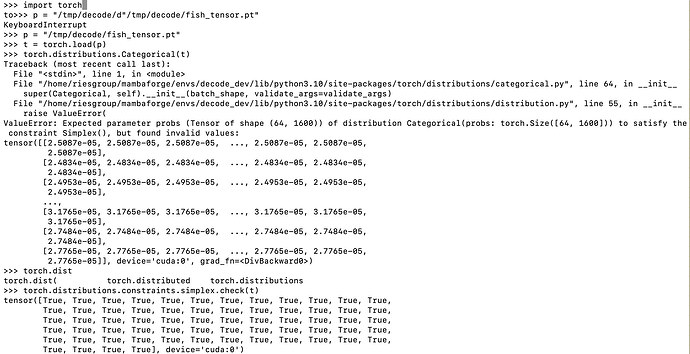Hi Lucas!
I can reproduce your issue using your fishy_tensor.
I believe that it is caused by a somewhat unlikely conspiracy of round-off
error, likely exacerbated by the fact that the rows of your probs tensor
are rather long (length 1600).
In your case your probs (fishy_tensor) are proper probabilities, with rows
normalized to sum to one (and it passes simplex.check()). Categorical
does not require its row-sums to be normalized to one, so it normalizes
them (in your case, redundantly, but Categorical doesn’t know this) before
it applies. simplex.check(). The normalization that Categorical applies
changes the round-off error a little bit and just happens to push one of the
row-sums a little bit over simplex.check()'s tolerance of 1.e-6, causing
Categorical to raise the error due to its internal call to simplex.check().
This script that uses your fishy_tensor illustrates these points:
import torch
print (torch.__version__)
print (torch.version.cuda)
print (torch.cuda.get_device_name())
fishy = torch.load ('fishy_tensor.pt')
print ((fishy.sum (dim = 1) - 1.0).abs().max()) # rows sum to one (up to round-off)
print (torch.distributions.constraints.simplex.check (fishy).all()) # passes test
fishy_norm = fishy / fishy.sum (dim = 1).unsqueeze (-1) # "normalize" rows to sum to one
print ((fishy_norm.sum (dim = 1) - 1.0).abs().max()) # rows sum not quite as well to one
print (torch.distributions.constraints.simplex.check (fishy_norm)) # fails
print ((fishy_norm.sum (dim = 1) - 1.0).abs() > 1.e-6) # simplex uses 1.e-6 as its tolerance
print (fishy_norm.sum (dim = 1)[45] - 1.0) # row 45 is the culprit
print (fishy_norm[45].sum() - 1.0) # but details of cuda sum matter
And here is its output:
1.12.0
11.6
GeForce GTX 1050 Ti
tensor(7.1526e-07, device='cuda:0', grad_fn=<MaxBackward1>)
tensor(True, device='cuda:0')
tensor(1.0729e-06, device='cuda:0', grad_fn=<MaxBackward1>)
tensor([ True, True, True, True, True, True, True, True, True, True,
True, True, True, True, True, True, True, True, True, True,
True, True, True, True, True, True, True, True, True, True,
True, True, True, True, True, True, True, True, True, True,
True, True, True, True, True, False, True, True, True, True,
True, True, True, True, True, True, True, True, True, True,
True, True, True, True], device='cuda:0')
tensor([False, False, False, False, False, False, False, False, False, False,
False, False, False, False, False, False, False, False, False, False,
False, False, False, False, False, False, False, False, False, False,
False, False, False, False, False, False, False, False, False, False,
False, False, False, False, False, True, False, False, False, False,
False, False, False, False, False, False, False, False, False, False,
False, False, False, False], device='cuda:0')
tensor(-1.0729e-06, device='cuda:0', grad_fn=<SubBackward0>)
tensor(-5.9605e-07, device='cuda:0', grad_fn=<SubBackward0>)
For what it’s worth, running your particular fishy_tensor on my cpu does not
show this behavior.
I assume that your code calls simplex.check() to protect against Categorical
raising an error. If you’re comfortable that your probs vector is legit, you could
instantiate Categorical with validate_args = False. (If you want to stick
with the validation and call simplex.check() for protection, I imagine that
(redundantly) normalizing your probs tensor (to mimic what Categorical does
internally) before making your call to simplex.check() might be an adequate
work-around.)
I also note – not that I think that you should read anything into this – summing
row 45 of fishy_tensor (after normalizing it) in isolation does not cross
simplex.check()'s 1.e-6 tolerance, while summing it as a row sum of the
whole tensor does. I assume that this causes a slight difference in innocent
round-of error due to the gpu using differing orders of operations in the two
cases.
I don’t really see this as a bug, but rather an “expected” consequence
of round-of error. One could argue, however, (and I suppose I do) that
Categorical / simplex.check() should take into account the length
of the probability vectors and widen out the tolerance as they become
longer.
Best.
K. Frank
